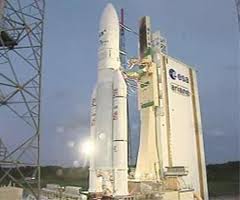The Ariane Conundrum
Two weeks ago, at the European Space Agency Ministerial meeting in Naples, Italy, Germany and France advocated competing views over the future of the Ariane V launch vehicle, and in particular how to respond to pricing pressure from SpaceX. Now, according to an article in Space News, the chosen course of action is already showing cracks.
The Ariane V, which holds a dominant position in the commercial satellite launch market, thanks in part to an outstanding launch record currently at 52 consecutive successful flights, has come under criticism in recent years due to the demand for launch subsidies to counteract financial losses and secure a break even financial status. At $160 million per year, the subsidy is substantially less than the nearly $1 billion annual subsidy American taxpayers hand out to United Launch Alliance, which builds the Atlas V and Delta IV launch vehicles, but it is nevertheless considered a problem.
The proposed solution, advocated by Germany and accepted at the recent ESA meeting is the Ariane V- ME, which stands for mid-life evolution. The upgraded rocket would feature a new, re-startable upper stage engine which will increase delivery capacity 20%. One of the main selling points originally pushed by Germany was that enhanced performance from the upgrade would allow ESA to eliminate the subsidy. According to the Space News article however, ESA Director-General Jean-Jacques Dordain expects the subsidy will only be reduced, and not eliminated.
If less than a month into the program, one of the primary players is already crawfishing, what are the odds this is going to work out well? Particularly considering the fact that in addition to whatever amount the “reduced” subsidies come to, it will take five years at the rate of existing subsidies to amortize the estimated $671 million Euro development costs.
The losing alternative, promoted by France, to proceed with immediate development of a modular Ariane VI, would no doubt take longer and cost more, but it at least had the advantage of not being doomed from the start. While there is merit in the claim that both efforts will benefit from the new upper stage engine originally sought for the Ariane V -ME; it also may lock Europe into a design solution which is too conservative, too little and too late.


